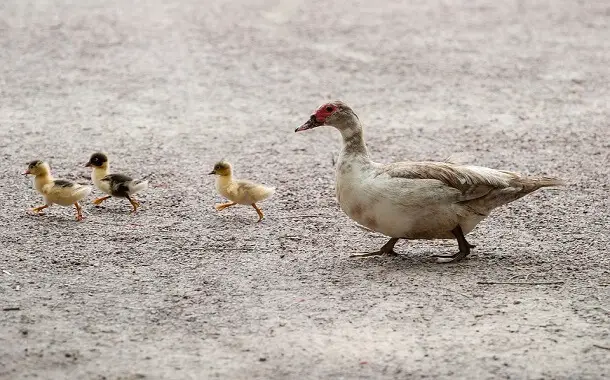How Much Does A Duck Cost?
Last Updated on April 9, 2024
Written by CPA Alec Pow | Content Reviewed by ![]() CFA Alexander Popinker
CFA Alexander Popinker
From their quacks to waddling walks, ducks have many appealing qualities that make them desirable as pets or as small-scale farming animals. However, like any animal, ducks require substantial commitment and investment throughout their lifespan.
This guide covers the full costs associated with acquiring ducks, providing housing and care to meet their needs, medical expenses, and tips for minimizing costs without sacrificing duck health and wellbeing.
While initial purchase costs for pet or flock additions start fairly low at $5 to $50 per duckling or adult duck, expenses like housing, feed, medical care, and accessories do add up over time into the hundreds or thousands, depending on flock size. We’ll explore average pricing across standard duck breeds so you can budget accurately before bringing home these quirky, aquatic birds.
How Much Does A Duck Cost?
For someone looking to get their first pet duck or breed small flocks, here are typical purchase costs:
- Ducklings – $5 to $10 per duckling chick, regardless of breed. Most farm stores sell duckling varieties like Pekins, Welsh Harlequins, Runners, and Calls shortly after hatching.
- Young adult ducks – $20 to $50 on average for a juvenile to 1 year old duck. Duck breeders may charge more for purebred specimens, larger meat breeds, exotic ornamental breeds, and show-quality ducks with elite conformational traits. Check local and online listings.
- Adult duck adoptions – Adoption fees at sanctuaries, rescues, and humane societies range from $0 to $20 for adult ducks being rehomed. Adoptees often come vet-checked, sexed, and with basic health certificates.
Add $5 to $15 more per duck for shipping costs if buying from a breeder remotely and having the ducks mailed to you. Pick-up locally whenever possible to avoid shipping stress on the birds. Ask about any health guarantees or return policies as well.
According to FinModelsLab, the cost of purchasing ducks for breeding and/or laying can vary depending on factors like breed and age. Ducks can range from $4 to $10 per duck, with breeds like Khaki Campbell costing around $8 and Pekin ducks around $5. Additional costs to consider include shipping fees, housing, feed, and veterinary care.
In a Reddit discussion, a user mentioned that their estimates for expenses per duck were about $15.50, with Muscovy ducks potentially costing more. Prices for duck meat can vary, with Muscovy ducks going for more than Pekin ducks. Prices for duck meat can range from as low as $3 per pound to as high as $14 per pound.
DuckBreedingStock.com offers day-old ducklings for breeding or meat ducks for commercial duck businesses. They provide pedigreed White Pekin duck strains for commercial growing, allowing customization based on market requirements.
The site offers duck parent stock for competitive egg production and meat ducks with characteristics like competitive growth rate and high meat carcass yield.
Factors Impacting Duck Prices
Several variables lead to pricing differences when sourcing ducks:
- Breed – Rare, ornamental breeds often cost more from breeders than common meat and laying ducks like prolific Pekins.
- Quality – Show-quality ducks selectively bred for elite traits like size, colors, and proportions demand premium pricing, sometimes hundreds more.
- Proven laying ability – Healthy mature female ducks actively laying abundant eggs command higher purchase fees.
- Health guarantees – Vet-checked ducks from reputable sellers free of illnesses often cost more upfront but save on future vet bills.
- Location – Prices fluctuate based on local duck availability, demand, and breeder competition. Urban areas may have higher costs.
First Year Duck Setup and Housing Costs
The first year of duck ownership entails some one-time setup costs for housing and equipment:
- Basic shelter – A basic duck coop or enclosure costs $200 to $500 to construct depending on size and materials. Prefab options are also available.
- Predator-proof fencing – For protective spaces, figure $100 to $200 for quality fencing and burial deterrents.
- Swimming water tubs – Durable plastic kiddie pools work well, around $50 for a medium size. Larger galvanized stock tanks run $200+.
- Bedding – Wood shavings, straw, sand, rice hulls to start, budget $50 to $100 annually.
- Feeders and waterers – Invest in heavy, tip-proof designs. Plan $50 to $150 for a quality set.
- Veterinary expenses – Initial check-up and vaccinations will be $50 to $100 per duck. May require follow-up boosters.
So budget about $600 to $1500 total for the first year’s housing and veterinary necessities when starting out with a small backyard duck flock. Costs scale up for larger enclosures and groups.
You might also like our articles about the cost of Cornish Game hens, Roosters, or Pigeons.
Annual Duck Care Costs
Recurring expenses to factor into your annual duck care budget:
- Feed – $100 to $300+ per duck annually depending on diet. More if ducks can’t graze and forage much.
- Clean bedding – $50 to $100 per duck for absorbent litter materials like pine shavings to maintain dry coop conditions.
- Routine veterinary care – Annual check-ups average $50 to $100 per duck. Plus potential illness treatment and emergency costs.
- Egg incubation – If breeding ducks, incubators start around $50 for basic models and $120+ for cabinet incubators.
- Fencing/enclosure maintenance – Reinforcing barriers and deterrents, $50+ annually. Varies based on damage.
So estimate around $200 to $500+ per duck for yearly recurring expenses, assuming quality basic feed suited to the breed, and no major medical issues or incidents. Budget heftily for waterfowl vet care. Costs may decrease after the first year when one-time purchases are covered.
Smart Tips for Saving Money on Ducks
 You can manage duck costs through choices like:
You can manage duck costs through choices like:
- Selecting common, hardy duck breeds optimized for backyard pets and small-scale eggs or meat production. Rare breeds often have more health issues that rack up vet bills.
- Sourcing or constructing utilitarian coops from cost-effective materials like wire fencing, proper sealing, scrap lumber, and metal roofing. Avoid ornate duck mansions.
- Using natural bedding materials like straw or sand when possible. Buy wood shavings in bulk or find free sources like local stables giving away used stall bedding.
- Allowing ducks free-range supervised foraging time to supplement feed with slugs, grubs, grass, and other natural foods. This reduces portion sizes needed.
- Purchasing quality feed in bulk once you know your flock’s nutritional needs. Look for volume discounts and club memberships for savings per pound/kg.
- Learning to perform weekly duck health checks, toenail trimming, and beak filing yourself using proper methods. Vet visits get pricier for minor upkeep tasks.
Conclusion
Ducks offer enjoyable companionship and productivity on a small farm or homestead but require serious commitment to their daily care and expenses over a 5 to 10 year lifespan.
With realistic planning using average cost information, budgeting for annual upkeep fees, and choosing lower-maintenance breeds, ducks can thrive and bring years of enjoyment without breaking the bank. Understand the responsibility before adding ducks, but costs need not deter you from welcoming these quirky waterfowl if prepared.
Frequently Asked Questions
Is it OK to get 1 duck?
Ducks are highly social animals, so keeping a single duck alone is not recommended. A solitary duck will become stressed, anxious, vocalize excessively, and show signs of poor psychological health. Two or more ducks should be kept together to satisfy their flocking instincts.
If getting only one duck is unavoidable, a mirror and lots of human interaction may help ease its sense of isolation. But ducks are happiest living with other members of their species.
Can I have a duck as a pet?
Ducks can make entertaining, personable pets given proper care and housing. Key considerations if keeping domestic ducks as pets include:
- Providing either a pond or kiddie pool for swimming space since ducks use water to clean feathers and stay healthy.
- Supplying a securely fenced yard or enclosure to keep ducks safely contained and prevent wandering.
- Being aware of town ordinances regarding poultry, coop placement, noise levels, etc. that apply to duck ownership.
- Committing time to care, feeding, socialization, and handling to keep ducks friendly and tame.
- Accepting duck behaviors like constant quacking, messiness, and high activity levels.
With their unique personalities, ducks offer delightful companionship for the right households prepared to meet their care needs.
Will pet ducks fly away?
Whether pet ducks will wander away depends heavily on the breed. Larger domestic duck breeds used for meat and eggs typically don’t fly well due to their size and feathers optimized for swimming over flight. Heavy Pekins, Appleyards, and Cayugas stay grounded.
However, smaller wild-derived ducks like Calls and Mallards can readily take flight. Carefully clipping flight feathers of one wing prevents aerial escape. Well-fenced enclosures are also essential for flight-capable breeds along with watchfulness when entering and exiting duck areas. With basic precautions, most pet ducks can be kept from straying too far from home.


Leave a Reply
Want to join the discussion?Feel free to contribute!